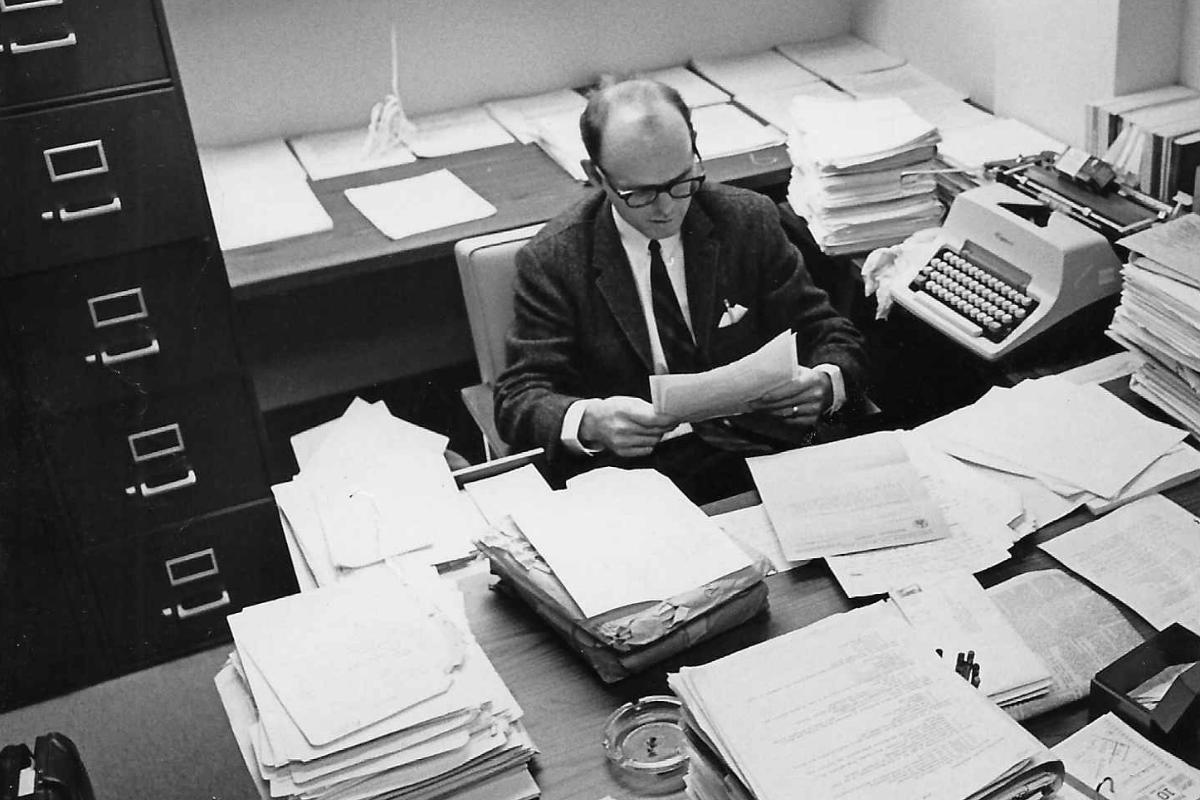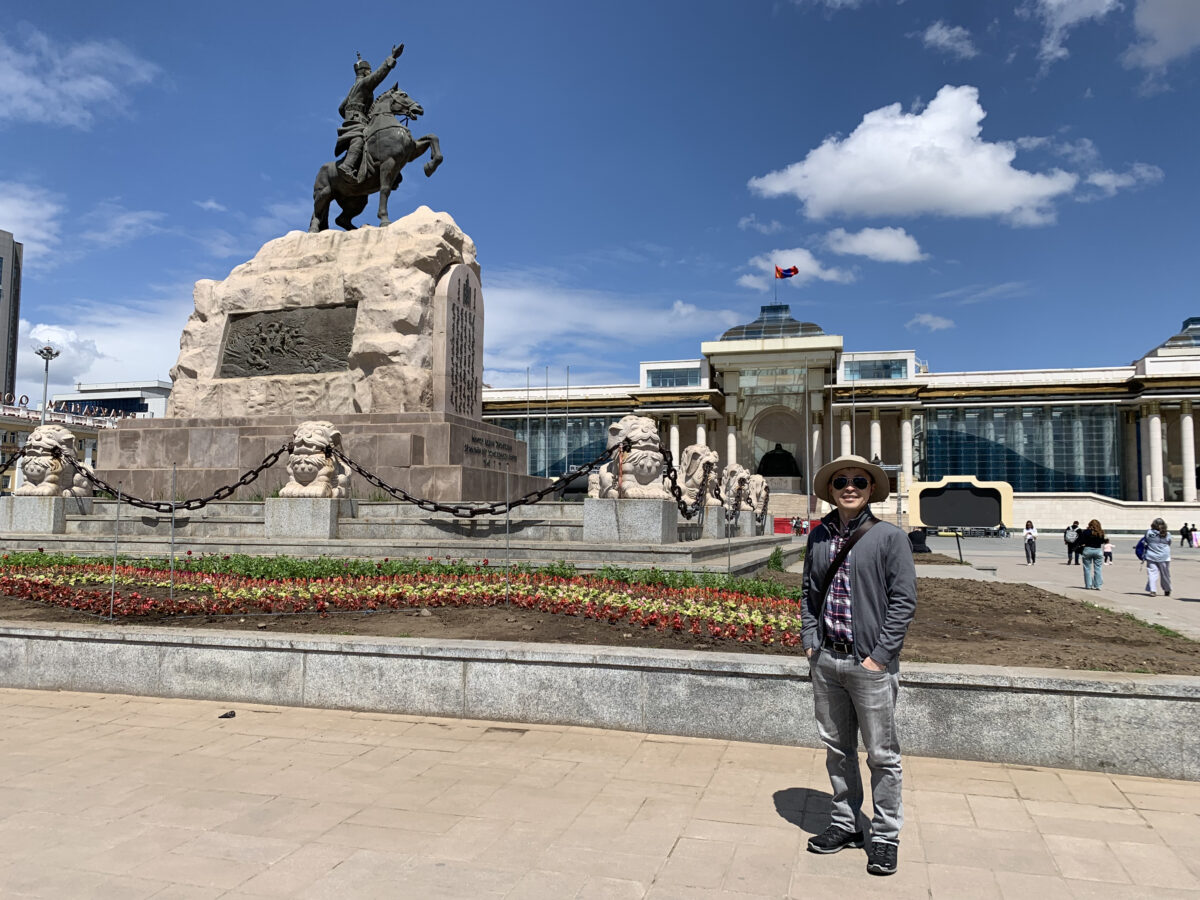As Charles “Chuck” Peake celebrated his 90th birthday late one December evening in 2022, a contingent of middle-aged investors, bankers, and academics—Retriever alumni of various decades—were present to cheer on the founder of UMBC’s economics program. As their professor and mentor, Peake had built a tight-knit but inclusive community of economics students and, half a century later, those social bonds still held strong.
“I was honored on my 90th birthday to have several of my former students travel from around the country to celebrate our formative years together at UMBC,” says Peake.
While sitting around the table, one of those students, Andrew Colyer ’89, economics, was inspired to ask his mentor about the early days of UMBC and the role Peake played in building the economics department.
The house that Chuck built
At UMBC, one of the benefits of being such a young university—just 57 years old—is that we are still so connected with our past and able to learn from the pioneers who helped found this university. Peake is one of those pioneers—here from the very beginning when campus consisted of just three academic buildings, plywood sidewalks, a lot of mud, and a whole lot more vision.
“Dr. Albin O. Kuhn, UMBC’s first chancellor, could be seen in his spare time using his tractor to carve out the route for the loop road that he envisioned,” recalls Peake.
“Chuck came to UMBC with the vision that the fledgling campus could become the ‘Swarthmore of Public Higher Education,’” says Marsha Goldfarb, professor emerita, economics, referring to the liberal arts college ranked No. 1 multiple times by U.S. News & World Report.
Peake was hired as the university’s very first professor in economics and entrusted with a daunting task—building the economics department from the ground up. Peake was up for that challenge but, holding fast to his vision of what UMBC could become, he had two conditions.
Pictured right: Peake in his office in 1969.
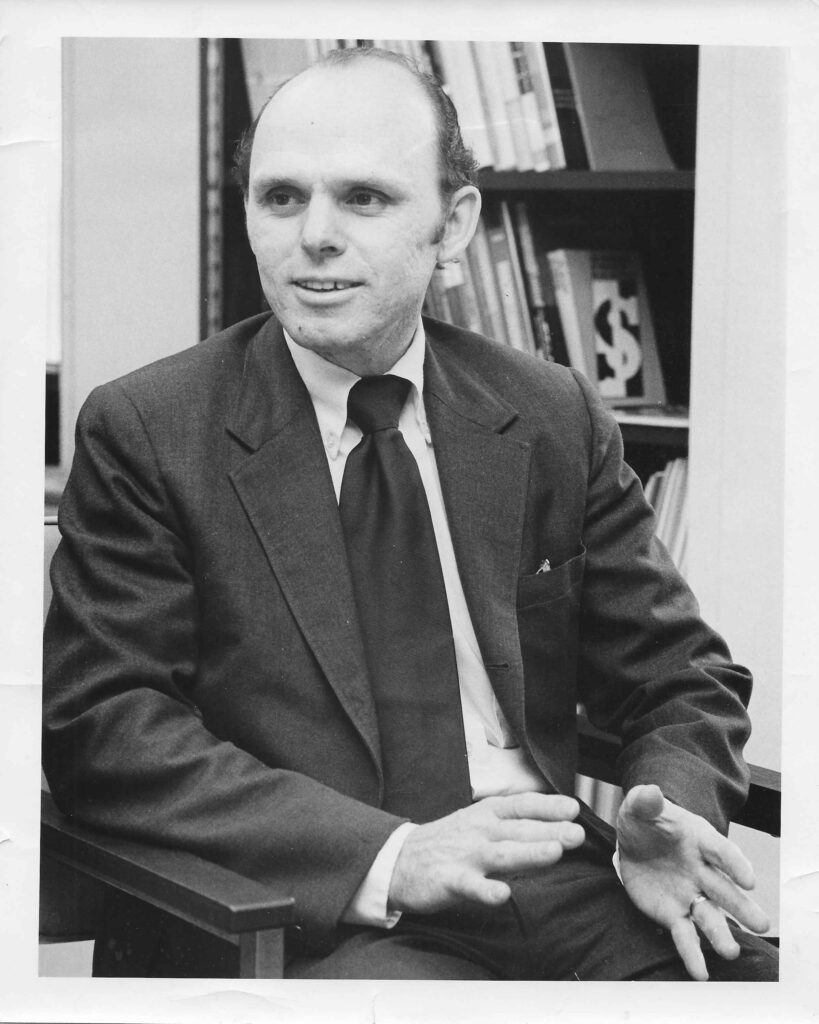
“First, I would get a graduate assistant, and second, economics professors would not be required to give large lectures.” However, Peake, recalls, “For the first economics course offered in 1967, we expected 30 or 40 students and, to our surprise, 170 students enrolled and we were compelled to offer a large lecture.”
Peake prioritized getting to know his students and engaging them in the learning process, says Joseph Gallagher ’93, economics. “As a student, the first thing Dr. Peake did was give you agency,” recalls Gallagher. “‘Mr. Gallagher, what are your thoughts on this?’ He did this with all his students. By empowering his students, it conveyed a gravity to his classes and made you take stock of your opinions and your own retention of concepts. Dr. Peake wanted you to be engaged in his class and wanted it to be a conversation.”
Of course, this type of classroom model is not really possible in a large lecture format. So, the emphasis quickly became recruiting additional faculty members to meet demand and decrease class sizes to support greater interaction between student and teacher. Peake set his sights high and started his recruitment efforts by contacting the department chairs of the top 10 economics programs in the country.
“Our strategy was to start with young faculty members who studied at the highest quality institutions,” says Peake. “Amazingly, our first six core faculty members did their graduate study at a top 10 economics program.”
The foundation for the economics department was in place. The students were eager to learn. The faculty members were young and ready to prove themselves. There was just one thing missing—a sense of community.
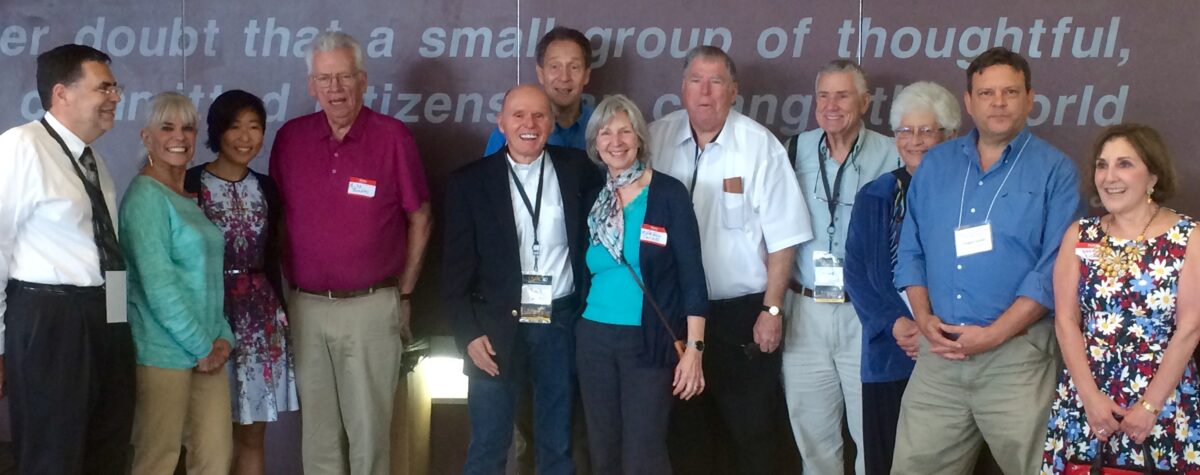
Building community beyond the classroom
“Dr. Peake was not only a great professor, role model, and mentor, but he was also very social and loved to have a good time,” says Donald Blair ’89, economics. “He definitely helped create a sense of strong culture within the economics department.”
Peake was instrumental in the formation of two student organizations: the Political Economy Club and the UMBC chapter of Omicron Delta Epsilon (ODE), an international economics honor society. He also sponsored the annual ODE banquet, when students were inducted into the honor society and awards were given out.
“This banquet was a major social event in the life of the department,” says Goldfarb.
At the banquet, recipients were also presented with the Gerald Goldman Scholarship, established in honor of an early economics major tragically killed during a summer construction project, the Omicron Delta Scholarship, and the Charles F. Peake Fund, established in honor of Peake by the UMBC Economics and Administrative Sciences Alumni Association, Inc. (EASAA).
Another endowment honoring Peake—the Charles F. Peake Endowment for Economics—was later started by Jack Mullen, III ’72, economics, the first UMBC alumnus to work on Wall Street, along with his wife, Carol Mullen ’70, American studies. This endowment helped establish the annual Mullen Lectures, which bring top economic minds from across the country to speak at UMBC.
As part of his community-building project, Peake began hosting social gatherings for the Political Economy Club and ODE at his home. He would cook a ham and students would bring various dishes for what Peake called a “Tennessee-style dinner.” One summer, he held a crab feast at his home to help educate out-of-state students on the culinary benefits of the Maryland blue crab.
“He was trying very hard to make UMBC more than just a commuter school,” says Colyer who, like Blair and Gallagher, credits Peake with much of his career success. “I definitely benefited from his getting to know me,” he says.

Credit where credit is due
“My office used to be down the hall from his office, and I just recall a line of students and alumni stopping by to hang out,” says David Mitch, current UMBC economics department chair.
“Dr. Peake helped me straighten up my life,” says Colyer, who had nearly failed out of another institution before transferring to UMBC. Today, Colyer is the director of research at The Ithaka Group and still values Peake’s practical approach to advising and education. “You weren’t just going to get an econ degree,” says Colyer. “Dr. Peake took some personal responsibility in making sure you had a career after graduation.”
Blair, who is now an investment banker at Raymond James, had a similar experience at UMBC. “I give Dr. Peake tons of the credit for steering me in the direction that completely influenced my career,” he says. “I was late to the job recruitment cycle, and Dr. Peake made calls on my behalf to the big four accounting firms at the time and was able to get me an interview and eventually a job at KPMG in Baltimore.”
“Dr. Peake’s influence went well beyond the classroom,” says Patricia Rudolph ’72, economics. “I believe that Dr. Peake’s help and guidance made my career possible. I had the vague idea that I wanted to be a college professor but I had no idea what I needed to do to achieve that goal. Dr. Peake took the time to help me through the entire process of applying for admission to a Ph.D. program.”
“He probably wrote more recommendations for grad school than any other professor,” says Colyer, who reconnected with Blair in the same MBA program at the University of Virginia.
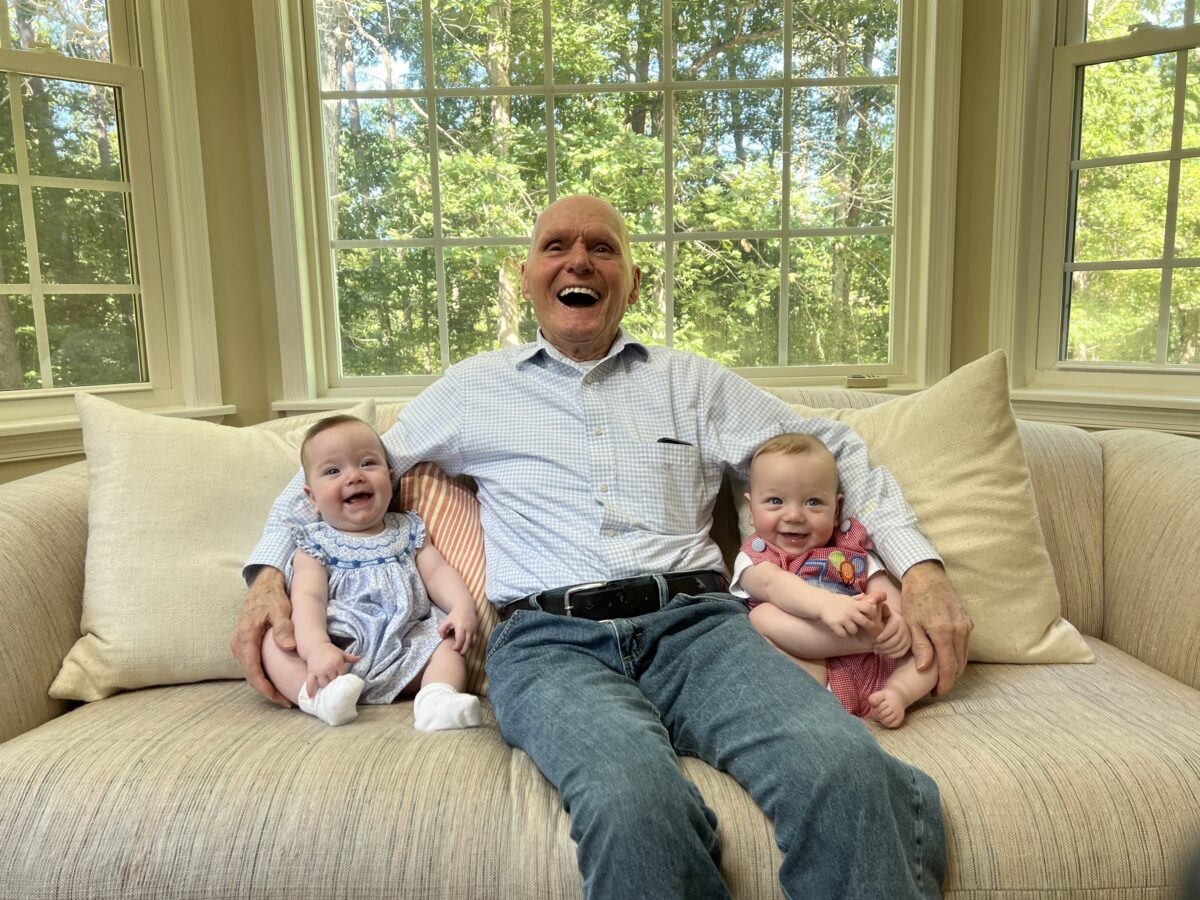
Innovating after retirement
Not even retirement can slow down a man like Peake. In fact, what he calls his “most important academic contribution to UMBC” didn’t even occur until 2001—two years after retiring—when the economics department launched its second major, the B.S. in financial economics, to go along with the traditional B.A. in economics.
“I spent about a decade preparing the proposed major,” says Peake. “With this credential, graduates found that it opened doors to Wall Street and other real-world pursuits well beyond academia.”
“Financial economics became extremely popular,” says Goldfarb. “And, before long, it attracted more students than the B.A.”
While Peake points to the B.S. as his most important academic contribution to UMBC, his former students know his kind nature and love for his students is his real legacy.
“He was always very supportive of his students and wanted the best for us,” says Blair.
“He always had time for everyone,” says Colyer, who was honored to have Dr. Peake attend his wedding.
“He is just a vessel of pure goodness,” adds Gallagher.
Tags: CAHSS, Economics, financial economics, Impact, Spring 2024

